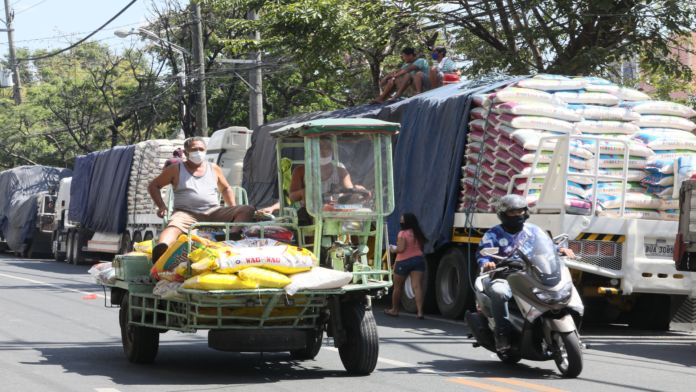President Ferdinand R. Marcos Jr. has prohibited local government units (LGUs) from collecting toll fees and charges on all motor vehicles transporting goods or merchandise.
Under Executive Order (EO) 41 inked by Marcos on Sept. 25, all vehicles in charge of transporting goods no longer need to pay “pass-through fees” while passing through any national roads and other roads not constructed and funded by LGUs.
Marcos’ directive aims to ensure the efficient movement of goods across the regions to revitalize local industries.
“The unauthorized imposition of pass-through fees has a significant impact on transportation and logistics costs, which are often passed on to consumers, who ultimately bear the burden of paying for the increase in prices of goods and commodities,” EO 41 read.
“In order to uphold the welfare and advance the best interest of the Filipino people, it is the overarching policy of the Administration to consolidate all essential components within the value and supply chain, and reduce the costs of food logistics, which play a pivotal role in effectively tempering the inflation rate in the country.”
In the interest of public welfare, EO 41 “strongly” urges all LGUs to suspend or discontinue the collection of fees that are imposed on all motor vehicles transporting goods and passing through any local public roads constructed and funded by these LGUs.
These include sticker fees, discharging fees, delivery fees, market fees, toll fees, entry fees, and Mayor’s Permit fees.
According to EO 41, reducing transport and logistics costs is one of the pillars of the Marcos administration’s eight-point socioeconomic agenda.
“Building a robust and collaborative partnership between the National Government and LGUs is essential in effectively addressing the impacts of inflation and promoting economic prosperity across all regions,” it said.
EO 41 directs the Department of the Interior and Local Government (DILG) to secure copies of existing ordinances of all LGUs on the collection of pass-through fees imposed on motor vehicles, including those issued under Sections 153 and 155 of Republic Act (RA) 7160 or the Local Government Code of 1991, within 30 days from the effectivity of the order.
The Department of Trade and Industry (DTI), Department of Transportation (DOTr), Department of Public Works and Highways (DPWH), Anti-Red Tape Authority (ARTA), and the Department of Finance (DOF) are tasked to evaluate the ordinances secured by the DILG to ensure compliance with RA 7160.
Administrative and disciplinary sanctions will be imposed on erring public officials or employees for failure to comply with the directives under EO 41.
“For this purpose, and consistent with its mandate of assisting the President in the supervision of local governments, the DILG shall take appropriate actions to ensure that the LGUs shall act within the scope of their prescribed authorities under Sections No. 133(e), 153, and 155 of RA No. 7160,” EO 41 said.
Section 153 of RA 7160 allows LGUs to impose and collect reasonable fees and charges for services rendered, while Section 155 of the law authorizes a local sanggunian (council) to prescribe the terms and conditions and fix the rates for the imposition of toll fees or charges for the use of any public road, pier or wharf, waterway, bridge, ferry, or telecommunications system funded and constructed by the concerned LGU.
On the other hand, Section 133(e) of RA 7160 provides that the taxing powers of local governments shall not extend to the levy of taxes, fees, and charges and other impositions upon goods carried into or out of, or passing through, the territorial jurisdictions of LGUs in the guise of charges for wharfage, tolls for bridges or otherwise, or other taxes, fees, or charges in any form whatsoever upon such goods or merchandise.
The DTI and DILG are directed to jointly submit reports to the Office of the President, through the Office of the Executive Secretary, on the compliance of LGUs with EO 41.
Within 30 days from the effectivity of the EO, the DTI, DILG, DOTr, DPWH, ARTA, and DOF are also tasked to formulate and issue guidelines as may be necessary, or amend or consolidate existing rules, regulations, or issuances as may be appropriate for the effective implementation of the order.
EO 41, which was made public on Friday, takes effect immediately upon its publication in the Official Gazette or a newspaper of general circulation. (PNA)


